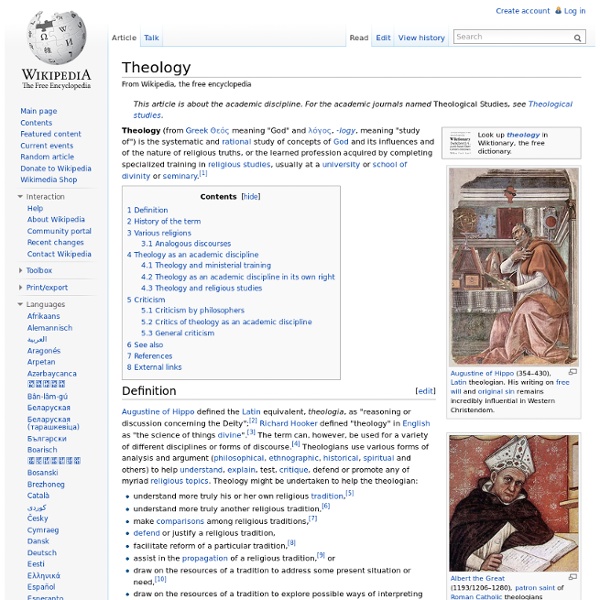Theology
Theology is the systematic and rational study of concepts of God and of the nature of religious truths, or the learned profession acquired by completing specialized training in religious studies, usually at a university or seminary or school of divinity.[1] Definition[edit] Augustine of Hippo defined the Latin equivalent, theologia, as "reasoning or discussion concerning the Deity";[2] Richard Hooker defined "theology" in English as "the science of things divine".[3] The term can, however, be used for a variety of different disciplines or fields of study.[4] Theologians use various forms of analysis and argument (philosophical, ethnographic, historical, spiritual and others) to help understand, explain, test, critique, defend or promote any of myriad religious topics. Theology might be undertaken to help the theologian: History of the term[edit] Various religions[edit] Analogous discourses[edit] Theology as an academic discipline[edit] Theology and ministerial training[edit]
Learn Biblical Languages
This page was last updated 19 June 2012 General NRSV Text NotesThe New Revised Standard Bible comes with textual and translational notes that give the reader valuable information about textual variants and alternative translations. This page expands on the explanation of the notes given in NRSV Study Bibles. Should be understandable even by those who don't know the original languages. NET Bible I'm in the early stages of actually using the free online New English Translation; so far I like it very much. Fonts for Scholars If you want to include actual Greek or Hebrew characters in a word processing document, you'll need to use a special font. New Testament (Biblical) Greek Reading the New Testament (and LXX) in Greek, Aloud or Otherwise: Learn the Greek alphabet Complete with sound files, so you can learn to sound out NT Greek words. Greek New Testament Read Aloud Download or listen online, to a chapter at a time or the entire New Testament, read aloud in Greek. Biblical Greek Courses:
Hebrew Language, Grammar Pronunciation-Transliteration
(adapted from ) The complete original document can be obtained from the American National Standards Institute (ANSI) For the ISO standard for binary representation of Hebrew, see ISO- 8859-8. Blue letters are printed, red letters are for handwritten script. Note 29.11.98: draft ISO standard column added (based on article) in Ha'aretz weekend supplement, 27.11.98). The apostrophe ( ' ) when added to the letters gimel, zayin, and tzadik, produces three new letters which are used in modern Hebrew to represent foreign sounds (in words borrowed from French, English, Russian, ...) that do not exist in Biblical Hebrew. The standard pronunciation of modern Hebrew is a simplified version of the Sephardi pronunciation: in particular, the kaf-kuf, chet-chaf, and tet-tav pairs are pronounced identically and the alef and ayin are both silent vowel stops. t is transliterated as tet (e.g. universita), th is tav (theorema), w is vav vav Possessives:
Hebrew Glossary
Then name Ashkenaz (Bereishit 10:3) has since the 10th century been identified with Germany. As the German and French Jews of the medieval period formed a uniform group in culture and religious customs, they were all referred to as Ashkenazim in contradistinction to the Sefardim or Spanish- Portuguese Jews. Ashkenazim are the people who use Nusach Ashkenaz, the prayer arrangement adopted by the medieval Franco-German Jews, including certain variations described as belonging to the Polish custom (Minhag Polin). In the 18th century, the Chasidic movement adopted the Sefardic arrangement of prayers; hence, the Chasidim have been called Sefardim on many occasions. The Ashkenazim in Eastern Europe developed an intense religious life, disseminating Talmudic scholarship among the people to a degree never before surpassed in Jewish history. Chasidim and Mithnaggedim and followers of the Haskalah movement (Maskilim) presented a changing pattern of types, trends and ideologies.
Schizophrenia.com, Indepth Schizophrenia Information and Support
Related:
Related:



